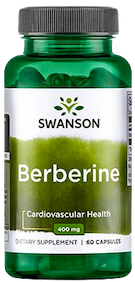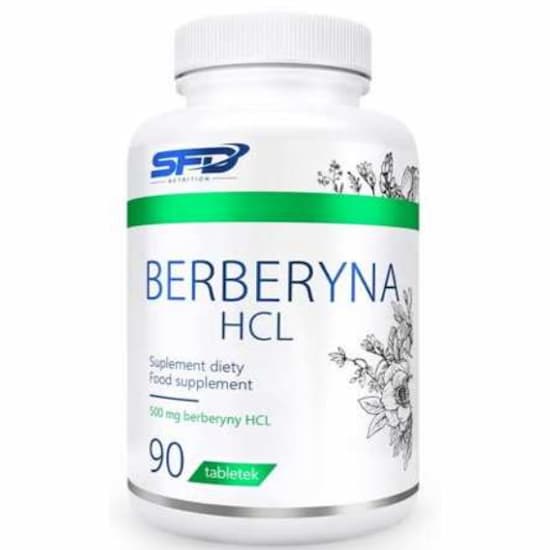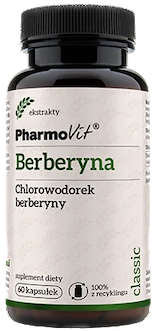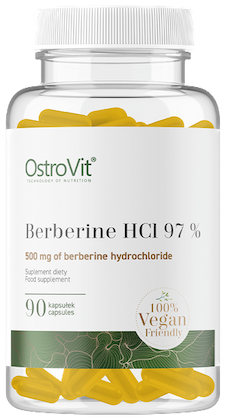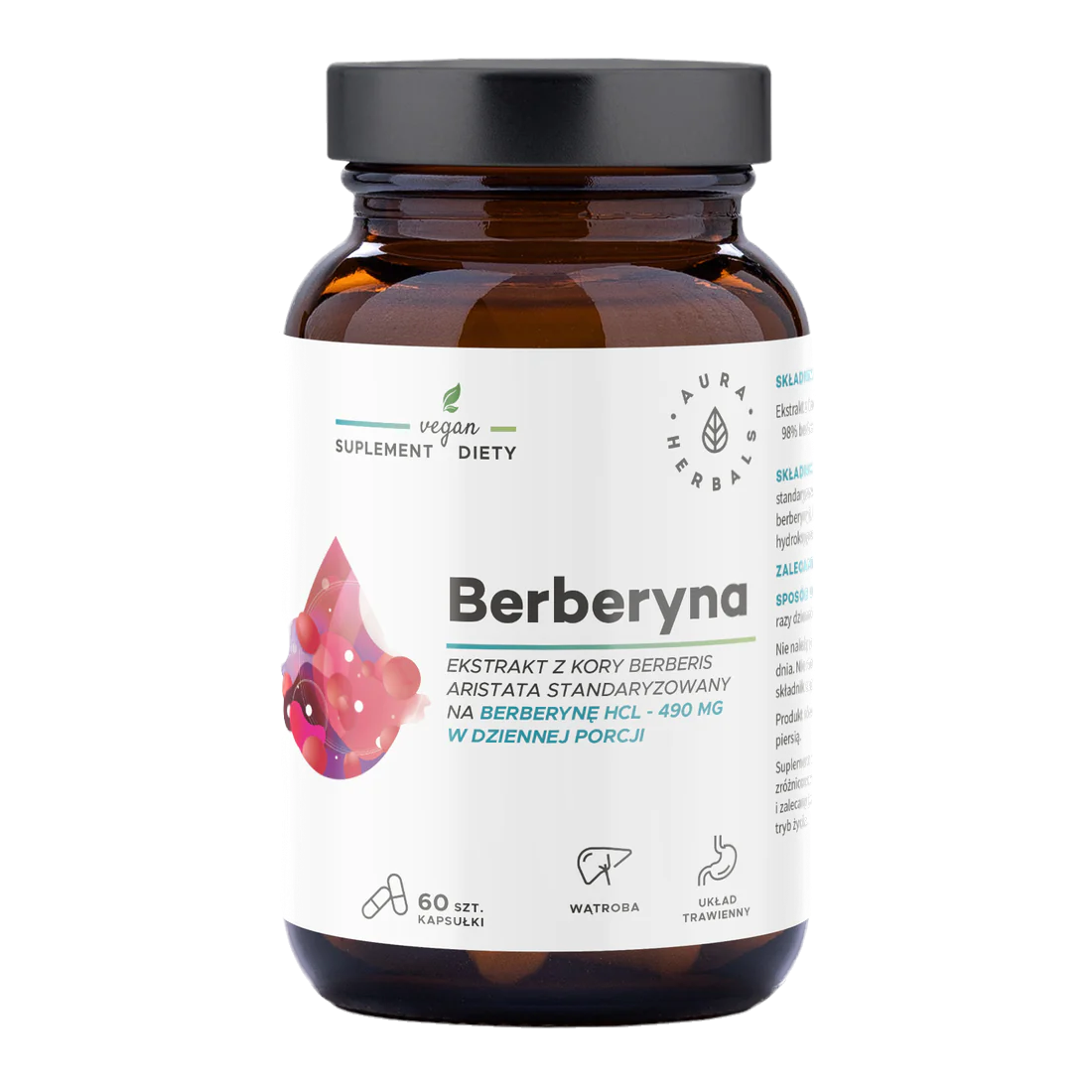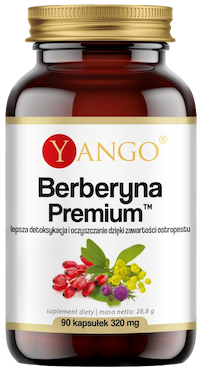Berberine for weight loss – does it work? Side effects and results
Does berberine slim down? Spoiler: no, but... Find out more about it and get expert opinions.


Learn more about our editorial process
.

Learn more about our editorial process
.

Learn more about our editorial process
.

Learn more about our editorial process
.
Why you can trust us
Articles on Natu.Care are written based on scientific research, data from government websites and other reliable sources. The texts are written in cooperation with doctors, nutritionists and other health and beauty experts. Articles are reviewed before publication and during significant updates.
.Learn more about our editorial process
.Information about advertisements
Content on Natu.Care may contain links to products from the sale of which we may receive a commission. When creating content, we adhere to high editorial standards and take care to be objective about the products discussed. The presence of affiliate links is not dictated by our partners, and we select the products we review ourselves completely independently.
.Learn more about our terms and Conditions
.Berberine - is this the new plant-based ingredient that will take a leaf out of the previous leaders of fat burners - caffeine and green tea?
.
Want to find out on your own body fat whether berba will help you prepare a beach body and slip into a smaller clothing size?
With the experts, I will show you how berberine works and how it doesn't work. Because although fat tissue literally doesn't 'burn off', something more interesting is happening to it.
From this article you will learn:
- Whether berberine slims down - according to science and anecdotally. .
- What is the best thing to do to lose weight.
- What to watch out for.
- What to watch out for during weight loss and supplementation for reduction. .
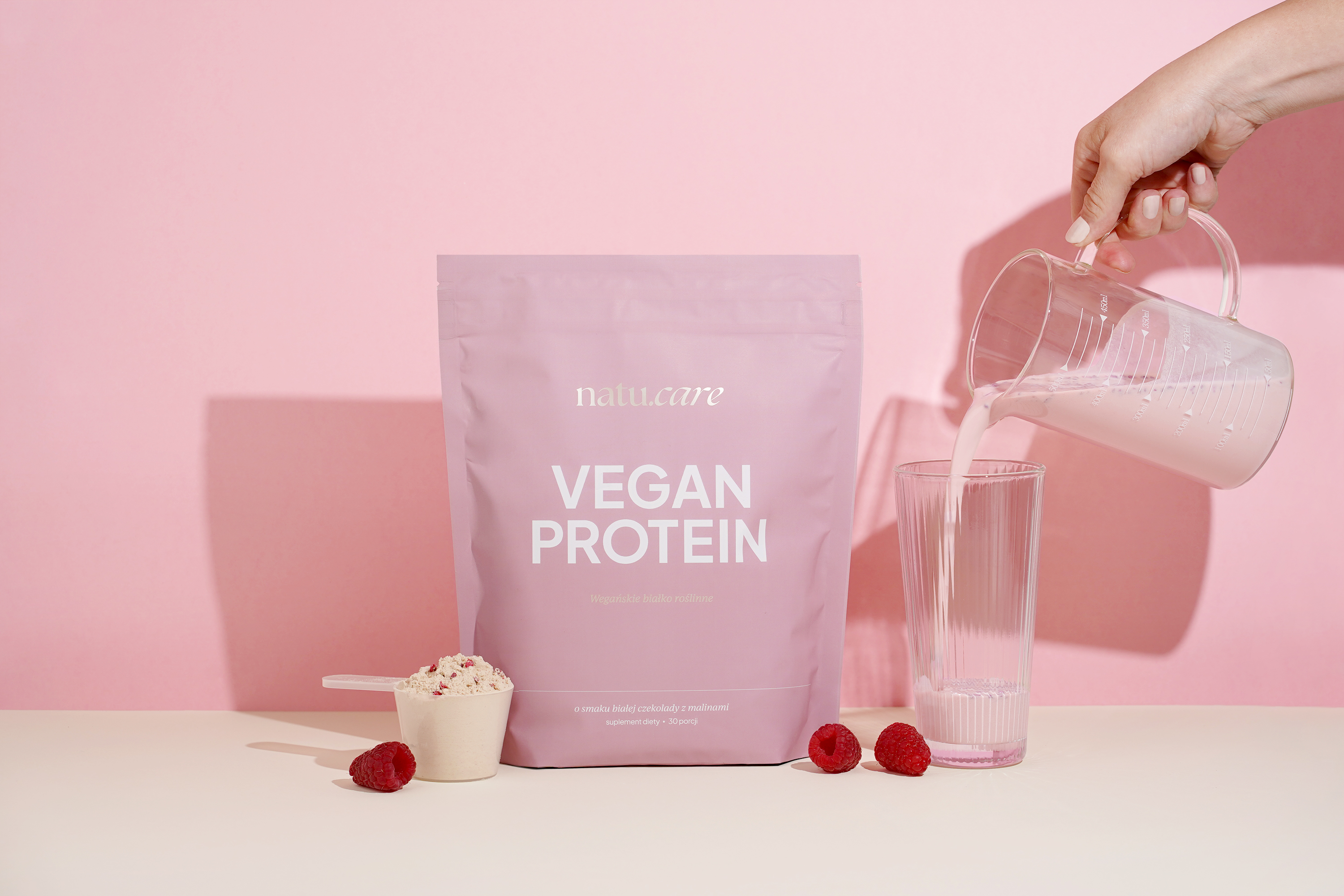
Odkryj, co dla Twojego zdrowia i urody może zrobić Białko Wegańskie, biała czekolada - malina
Natu.Care Białko Wegańskie, biała czekolada - malina
Pyszne, wegańskie białko roślinne, biała czekolada i malina - pomoże uzupełnić Twoją dietę w wartościowe proteiny. To aż 26 g białka i tylko 136 kcal w porcji.
Sprawdź cenę
Dzięki białku od Natu.Care moja odporność się poprawiła a włosy wzmocniły. A smak białej czekolady z maliną - to świetnie połączenie!Gabriela
See also:
Berberine - what is it and what does it help with?
.
Berberine is a bioactive compound present in several species of plants including barberry, Canadian bitterroot and common mahoniaand. Berberine is an alkaloid, a plant-derived chemical compound with potent effects on the bodyand.
.
Alkaloids act on the body by interacting with receptors in the brain and other organs. These compounds can have different types of properties, such as analgesic, stimulant, sleeping, antipyretic or hallucinogenic . Many alkaloids are used in medicine and pharmacology to produce drugs.
Recent scientific research suggests that berberine:
- lowers the concentrations of total cholesterol, LDL cholesterol (so-called bad cholesterol) and triglyceridesand
- increases HDL (so-called good cholesterol)
- lowers blood sugar levels in people with type II diabetes
- lowers ApoB - an important indicator of cardiovascular disease risk
Apolypoprotein B (ApoB) is a protein present on the surface of 'bad' LDL cholesterol particles. Its high concentration is associated with the risk of heart disease..
 .
.
Aleksandra Cudna-BartnickaClinical nutritionist
Summary
.Scientific studies show that berberine supports sugar-insulin metabolism and the cardiovascular system. It may be helpful in people who have problems with high cholesterol or blood sugar.
Berberine for weight loss?
.
Berberine by itself does not lose weight. Consuming berberine capsules alone will not affect fat loss. However, when combined with a reduction diet and physical activity, it can aid weight loss by affecting enzymes that inhibit glucose and fat synthesis.
According to animal studies, berberine affects the activity of the enzyme AMPK, which inhibits glucose and fat synthesis. Regular stimulation of this enzyme has an effect in our body similar to that of regular physical activity..
 .
.
Julia SkrajdaDietitian
..
According to other animal studies, berberine inhibits the enzyme PCSK9and. This leads to more 'bad' LDL cholesterol being removed from the bloodstream. The mechanisms and effects on humans are not fully understood.
Many manufacturers are treading on thin ice and offer hope for effective weight loss with berberine. They cite scientific studies with incredible hurrah optimism. They promise to 'tighten your trousers at last' and 'melt away fat'. Wow.
I have analysed for you below some of the scientific studies that have tested the effects of berberine on weight loss.
Analysis of scientific studies on berberine
.
There are many papers by researchers on the effects of berberine on sugar-insulin metabolismand. They are of high quality and have been carried out on large numbers of people. The results are clear - berberine is helpful in regulating cholesterol and sugar. And how's that for weight loss?
.
Study from 2012 (USA)
.
The study involved 16 obese individuals of both sexesand. The subjects were given 500 mg of berberine three times a day for 12 weeks. The results showed that participants lost an average of 2.3 kg of body weight and 3.6% of body fat. Blood lipid levels also decreased (23% decrease in triglycerides and 12.2% decrease in cholesterol).
Ok, but...
.Only seven people persevered to the end of the study - a small sample size. During the study, the participants followed a reduction diet (reducing kilocalorie intake by about 20-25%) and did physical activity (mainly aerobic exercise) once a day for 30 min - not surprisingly, they lost weight. Where berberine contributes here - is unknown.
.Study from 2012 (China)
.
This study involved 41 people diagnosed with metabolic syndrome (which is how co-morbid factors that increase the risk of developing cardiovascular disease are definedand).
For 12 weeks, the study participants received 300 mg berberine three times a day. Participants did not change their physical activity or diet. Ultimately, the participants' BMI decreased from 31.5 to 27.4. They lost body fat from the abdominal area and improved their blood parameters.
The participants' BMI decreased from 31.5 to 27.4.
This study says more about the potential of berberine in weight loss than the first one. The weight loss in the participants may have been related to the fact that berberine helps control insulin and other hormones that regulate fat cells.
The study also found that berberine helps control insulin and other hormones that regulate fat cells.
Newly noteworthy is the improvement in blood test results, particularly the lowering of glucose and cholesterol levels, which berberine has been shown to affect according to the researchand.
A 2015 study on... hamsters (China)
.
In a 2015 scientific study involving 124 Syrian hamsters, a specific diet was used - the rodents were fed foods high in sugars and fats. Some of them were then given berberine. The study showed that berberine reduced body weight and improved glucose tolerance in the rodents that received itiand.
It is good that the fat hamsters lost weight and their blood test results improved. It is a pity that not all manufacturers of berberine weight loss products mention this sacrifice of the rodents.
Animal research - ethical dilemmas aside - is valuable, but only for testing preliminary hypotheses. When evaluating scientific sources, always focus on human studies.
Human research.
Research from 2018 (China)
.
On the website of one 'weight management' product, the manufacturer cited this scientific study, which showed that the combination of berberine and resveratrol lowers blood lipids, which has a beneficial effect on cholesterol.
Yes, but these results don't relate to berberine alone, but its combination with resveratrol and most importantly, this study also on rodents.
P.S. Remember - no product will control your body weight. Only you can do that.
Research conclusions
.
There are also some interesting studies in which rodents were fattened and then given berberine. This compound also caused them to lose weight and improve blood parameters such as sugar and cholesteroland.
There are also meta-analyses involving humans, but the number of participants or other factors influencing the conclusions do not directly show that berberine unequivocally affects weight lossand.
.
As you can see - the citation of berberine's slimming properties by manufacturers is a rubbish exaggeration. More scientific research with humans is needed to know the effects. Let's leave the poor rodents alone.
Did you know that...
.Rritters are used in research because they are cheap, easy to breed and their short lifespan allows for long-term studies. Their use minimises the risk of adverse effects compared to human testingand.
In a nutshell
.Berberine can support weight loss, but you'll get the best results from a reduction diet and regular physical activity, and treat berberine as a supplement.
Losing weight with berberine - how to get started?
.
If you decide to test the properties of berberine, do it with your head and with the best quality product. Read what to look out for before you start consuming berberine. I recommend you take blood tests, weight measurements and body circumferences - it will come in handy.
Contraindications
.
Do not use berberine if:
.
- .
- you are allergic to berberine, .
- you are pregnant, .
- you are breastfeeding, .
- you are under 18 years old, .
- you suffer from damage to or disease of the liver, .
- you are taking blood sugar-lowering, blood pressure-lowering, immunosuppressant or sedative drugs.
If in doubt - consult your doctor.
.
See also:
.
Side effects
.
Berberine is relatively safe, but like any substance, it can cause side effects in some such asand:
- abdominal pain, .
- nausea, .
- diarrhoea, .
- constipation, .
- incontinence, .
You will minimise the risk of side effects if you do not exceed the daily doses and familiarise yourself with the contraindications.
See also:
Dosage
.
Follow the manufacturer's recommendations for daily dosage. In research studies with humans, doses used ranged from 300 to 2000 mgand. The body's response to portions higher than 2g is unknown. But do not test on yourself.
Berberine is worth taking before or during a meal to increase its absorption. Greater bioavailability of the active substance is also influenced by fat.
Berberine 'likes' with healthy fats. It is best consumed with fatty milk, eggs, nuts, salmon, avocado or olive oil..
 .
.
Ilona Krzak Master of Pharmacy
.
Berberine - after what time of effects?
.
The effects of berberine combined with a reduction diet and physical activity can be seen in as little as 7-10 days. Assuming an optimal calorie deficit, your body weight should decrease by around 0.3-1 kg during this time. Your body circumference should also decrease (how much and where is an individual matter).
On a reduction diet, the body draws triglycerides from storage in fat cells to convert them into energy. At the same time, the size of fat cells and the appearance and shape of the body are reduced..
 .
.
Aleksandra Cudna-Bartnicka Clinical nutritionist
.
When adipose tissue is broken down for energy through cellular processes, two main by-products are released - carbon dioxide and waterand. CO2 is exhaled when you breathe (yes, you exhale fatty tissue) and water is removed through urine, sweat or with exhaled air .
Berberine - which one to choose to make it work?
.
The commercially available forms of berberine in capsule or tablet form are:
.
- berine HCl (berberine hydrochloride), .
- berine SO4 (berberine sulphate).
- berine HCl (berberine hydrochloride).
Products with berberine hydrochloride are a better choice, as this form dissolves in water much better than sulphate.
Pure berberine is poorly soluble in water. More than 50% of unchanged berberine is excreted. Much of the compound is rapidly metabolised by the liver, with bioavailability as low as 0.4%. Therefore, choose the berberine hydrochloride form so that it can work at all..
 .
.
Ilona Krzak Master of Pharmacy
Note the standardisation and DER (Drug Extract Ratio).
Standardisation determines whether there is, and in what quantity, an active ingredient in a product. DER specifies the amount of raw material from which the extract was obtained. For example, a DER of 5:1 means that 5 g of a given raw material yields 1 g of extract. The higher the DER, the better the product..
 .
.
Witold Tomaszewskidoctor of medical sciences
In brief
Choose berberine hydrochloride with the stated standardisation and DER so that you do not buy siana.
Berberine Swanson HCL
Product description
The preparation contains berberine, a plant active substance whichós positive effect on the regulation of sugar-insulin metabolism and lowers the concentration of „bad” cholesterol, increasing the concentration of „good” cholesterol. It can also aid weight loss.
.Pros and cons
The preparation contains berberine, a plant active substance whichós positive effect on the regulation of sugar-insulin metabolism and lowers the concentration of „bad” cholesterol, increasing the concentration of „good” cholesterol. It can also aid weight loss.
.Additional information
The preparation contains berberine, a plant active substance whichós positive effect on the regulation of sugar-insulin metabolism and lowers the concentration of „bad” cholesterol, increasing the concentration of „good” cholesterol. It can also aid weight loss.
.Expert opinion
The preparation contains berberine, a plant active substance whichós positive effect on the regulation of sugar-insulin metabolism and lowers the concentration of „bad” cholesterol, increasing the concentration of „good” cholesterol. It can also aid weight loss.
.Product description
The main ingredient in the preparation is berberine in the form of a standardised extract. It has anti-inflammatory and antioxidant effects and lowers blood lipid levels.
Expert opinion
The preparation contains Indian barberry extract – standardised for berberine hydrochloride. This substance exhibits anti-inflammatory, antioxidant, antimicrobial, blood lipid-lowering and hypoglycaemic effects.

Ilona Krzak master of pharmacy
Additional information
<p>Usually, large fluctuations in blood glucose and abnormal glucose utilisation are the causes of weight gain. A definite advantage of the preparation is the standardisation of the extract. This way, you know how much of the active substance you are getting. There are also reports that <a href=‘https://natu.care/pl/rosliny/berberyna-na-odchudzanie’>berberine</a> is helpful during the pharmacotherapy of depression.</p>
<p><strong>Learn more about berberine and its properties in Nina Wawryszuk's article: </strong><a href="https://natu.care/pl/rosliny/berberyna"><strong>Berberyna – działanie, właściwości, skutki uboczne, dawkowanie</strong></a></p>
Product description
Berberine supports sugar and insulin metabolism, the cardiovascular system and liver function. It can promote weight loss, protect the liver and positively influence the gut microbiome.
Pros and cons
Berberine supports sugar and insulin metabolism, the cardiovascular system and liver function. It can promote weight loss, protect the liver and positively influence the gut microbiome.
Additional information
Berberine supports sugar and insulin metabolism, the cardiovascular system and liver function. It can promote weight loss, protect the liver and positively influence the gut microbiome.
User review
Berberine supports sugar and insulin metabolism, the cardiovascular system and liver function. It can promote weight loss, protect the liver and positively influence the gut microbiome.
Product description
Berberine supports sugar and insulin metabolism, the cardiovascular system and liver function. It may support weight loss, protect the liver and have a positive effect on the gut microbiome.
Pros and cons
Berberine supports sugar and insulin metabolism, the cardiovascular system and liver function. It may support weight loss, protect the liver and have a positive effect on the gut microbiome.
Additional information
Berberine supports sugar and insulin metabolism, the cardiovascular system and liver function. It may support weight loss, protect the liver and have a positive effect on the gut microbiome.
Berberine supports sugar and insulin metabolism, the cardiovascular system and liver function. It may support weight loss, protect the liver and have a positive effect on the gut microbiome.
Product description
Berberine supports sugar and insulin metabolism, the cardiovascular system and liver function. It may promote weight loss, protect the liver and positively influence the gut microbiome.
Pros and cons
Berberine supports sugar and insulin metabolism, the cardiovascular system and liver function. It may promote weight loss, protect the liver and positively influence the gut microbiome.
Additional information
Berberine supports sugar and insulin metabolism, the cardiovascular system and liver function. It may promote weight loss, protect the liver and positively influence the gut microbiome.
Product description
A dietary supplement with berberine, whichóra has a positive effect on sugar-insulin balance and reduces the risk of heart disease. It can support the weight loss process.
Pros and cons
A dietary supplement with berberine, whichóra has a positive effect on sugar-insulin balance and reduces the risk of heart disease. It can support the weight loss process.
Additional information
A dietary supplement with berberine, whichóra has a positive effect on sugar-insulin balance and reduces the risk of heart disease. It can support the weight loss process.
A dietary supplement with berberine, whichóra has a positive effect on sugar-insulin balance and reduces the risk of heart disease. It can support the weight loss process.
Berberine and weight loss dieticians' opinions
.
Berberine has good reviews among specialists because it supports digestive and metabolic complaints, which affects weight loss. Berberine may be helpful in patients trying to reduce body weight.
Today's times are not conducive to healthy eating, which can translate into elevated blood sugar and cholesterol levels and overweight. Berberine taken in safe doses and combined with a nutritious diet can be helpful in lowering these parameters and losing weight..
 .
.
Aleksandra Cudna-BartnickaClinical nutritionist
Berberine improves the mechanisms of the glycaemic system, which helps stabilise the processes involved in weight loss. It streamlines this process - it acts as a 'snap' on the body to make it respond better to the whole reduction process. You will achieve the best results when combined with physical activity and a reduction diet..
 .
.
Julia SkrajdaDietitian
.Berberine is worth using for the initial symptoms of impaired insulin and sugar balance, which can help you recover from this without the need for medication. It will also help to maintain the entire homeostasis of the body, thus improving our health parameters at the level of virtually every system of our body..
 .
.
Marta Kaczorekclinical nutritionist and personal trainer
.
My experience with berberine - have I lost weight?
.
I used berberine for 8 weeks with the aim of reducing total cholesterol and LDL cholesterol, which were slightly elevated in blood tests. I bought a dietary supplement with high-quality berberine (standardised), with 500 mg of berberine in 1 capsule. Out of curiosity, I weighed myself and measured my body circumferences to see if anything would change.
For two months, I deliberately did not modify my menu and my workouts did not change in terms of frequency and intensity. After the supplementation, my LDL cholesterol (so-called bad cholesterol) and total cholesterol decreased. I have reached the recommended standard.
My body weight and circumferenceshave not changed, so as you can see, just ingesting the capsules has not caused me to lose weight.
What does weight loss actually do?
.
Reduction diet. Closing topic. Well, let me explain in more detail.
There is no such thing as a "broken metabolism" and "weight gain out of thin air". Don't let yourself be told that. You can't cheat physics and biology. A surefire way to lose weight is to reduce diet, which means consuming fewer kilocalories (by about 300-500 kcal) than your calorie requirements suggestand.
If you are not losing weight, it means you are not in a deficit.
.
Some illnesses or medications can slow your metabolism, cause water retention, mask weight loss, reduce your desire to be active and cause excessive appetite .
Several illnesses - especially when left untreated - can hinder weight loss. The most common are thyroid diseases (Hashimoto's, hypothyroidism), polycystic ovary syndrome, insulin resistance. The problem passes when a treatment properly tailored to the patient is implemented..
 .
.
Aleksandra Cudna-Bartnicka Clinical nutritionist
.
The best way to control the deficit is to count calories accurately, e.g. with an app, or to stick strictly to the menu agreed with the dietician. If, after 10-14 days, your body circumferences or weight have not changed, you are not in a deficit or it is time to do blood tests and address health.
How to lose weight safely.
The best way to lose weight is to consult a dietitian, who will tailor a menu and determine your calorie requirements based on a detailed history of your health, illnesses, lifestyle and diet. A healthy weight loss is around 0.5-1kg per weekand.
Losing weight is a long-term process that should not be quick and drastic. Think in terms of several weeks or a few months. What matters is quality and consistency, not speed. It's nice if you add your favourite physical activity to your diet. You don't have to hijack CrossFit or run marathons straight away. You can start with a daily half-hour walk with poles or walking the dog.
From the office of a nutritionist
Alexandra Cudna-Bartnicka tells:
.
One of my patients needed to lose weight due to preparation for a major operation. Using the diet alone and introducing only daily exercise in the form of walking the dog and cycling, he managed to lose as much as 10 kg in 1.5 months. Not only has his figure improved, but also his energy and attitude to life.
How not to slim down?
.
Based on my experience with my clients with whom I train and conversations with dieters, I observe harmful behaviours that, instead of losing weight, destroy the body and the motivation to lose weight.
How not to lose weight?
The worst thing you can do in losing weight is:
.
- .
- starve yourself, .
- skip meals, .
- do "detoxes", .
- eliminate "recreational" products (e.g. favourite sweets), .
- train too intensively, .
- skip recovery, .
- treat activity only as a task to be performed, not a pleasure, .
- comparing oneself to others, .
- collect fat burners and other preparations for weight loss, .
Restrictive diets (e.g. Dabrowska fasting or juice detoxes) are a shock to the body and can lead to hormonal imbalances, nutrient deficiencies or overeating attacks.
.
 .
.
Alexandra Cudna Clinical nutritionist
.
"Sometimes I observe that people with insulin resistance or a tendency towards sugar imbalances use dangerous juice detoxes after the holidays or festivities to 'cleanse' themselves. Consuming juices in such quantities causes huge sugar spikes in the blood and leads to micro-damage to blood vessels. In diabetics, it can end in a hyperglycaemic coma," adds Aleksandra Cudna.
.
Remember that for cleansing the body there are the liver and kidneys, which do an excellent job of it.
See also:
Summary
.
- Scientific studies involving humans do not conclusively confirm that berberine slims down. It may assist in the weight loss process, but it does not lose weight on its own.
- Berberine has been found to have the following effects.
- The best weight loss results will be achieved by following a weight-reduction diet in combination with your favourite physical activity.
- Scientific evidence to date shows that berberine supports the sugar-insulin balance and the cardiovascular system.
- Berberine lowers total cholesterol, LDL 'bad' cholesterol and triglycerides and raises HDL 'good' cholesterol.
- Reduces ApoB, an important indicator of cardiovascular disease risk. .
- If you want to lose weight, take advice from a nutritionist. He or she will help you establish a healthy calorie deficit and teach you how to compose wholesome and filling meals.
FAQ
.Which berberine is the best?
.The best berberine is Aura Herbals' berberine with 98% berberine HCl bark extract. Good quality formulations with berberine are in HCl (hydrochloride) form. They contain a daily dose of at least 500 mg and have a standardisation given by the manufacturer. This way you know what quality the extract is and can count on positive effects.
Berberine - how much weight can you lose?
.By consuming berberine, doing regular physical activity and following a reduction diet, you can lose around 0.3-1 kilograms per week. This is a safe for health weight loss that minimises the risk of energy loss, loss of muscle tissue, impaired concentration and fluctuations in hormones. The key, however, is simply to burn more calories than you consume.
Does berberine suppress cravings for sweets?
.Mouse studies show that berberine can inhibit the appetite for sweets by affecting the ratio of adiponectin (a protein produced by adipose tissue) and leptin (the satiety hormone), regulating appetite, satiety sensation and stimulation of fat metabolism. Berberine improves the mechanisms of the glycaemic system, which helps stabilise weight loss.
Does berberine burn fat?
.No, berberine by itself does not burn body fat. Studies in mice suggest that it may affect enzymes and hormones that directly or indirectly affect metabolism, digestion, appetite and thus promote fat loss. You will achieve fat burning with a reduction diet, and consider berberine to support weight loss.
Berberine HCl - which is best?
.The best berberine HCl (hydrochloride) should contain a daily dose of at least 500 mg and have the standardisation stated by the manufacturer. This way you know what quality the extract is and can count on positive effects. Recommended berberine is, for example, Aura Herbals' berberine with 98% berberine HCl bark extract.
Does berberine reduce appetite?
.Mouse studies suggest that berberberine may reduce appetite by affecting adiponectin (a protein produced by adipose tissue) and leptin (the so-called satiety hormone). It can regulate appetite, stimulate adipose tissue metabolism and lower sugar concentrations, which helps stabilise processes associated with weight loss.
How long can you take berberine?
.In human research studies, berberine has been used for up to 3 months. It is safest to use it for no longer than 3 months. Some studies indicate that berberine may adversely affect the heart muscle if used for long periods.
Berberine doctors' opinions - what do the experts think?
.Berberine has a variety of opinions from doctors - ranging from enthusiasm to reserve. Above all, doctors stress that berberine (even high quality HCL 98%) is classified as a dietary supplement, which serve to supplement the diet and not treat ailments.
Doctors caution against the decision to introduce berberine into supplementation on its own, especially if the patient is taking blood sugar-lowering, blood pressure-lowering, immunosuppressive and sedative medications.
Berberine in the morning or evening?
.Berberine is best taken before or during meals to ensure it is better absorbed into the body, so it will work more effectively. It is recommended to take berberine in the morning and evening with a meal to maintain its increased concentration in the body.
Does berberine exist in drug form?
.No, there are no berberine preparations in the form of an over-the-counter or prescription drug in Poland. Available products are mono- or multi-ingredient nutritional supplements containing berberine or berberine extract in the form of tablets and capsules.
.
Sources
.See all
.Aliverti, A. (2016). The respiratory muscles during exercise. Breathe, 12(2), 165-168. https://doi.org/10.1183/20734735.008116
Asbaghi, O., Ghanbari, N., Shekari, M., Reiner, Ž., Amirani, E., Hallajzadeh, J., Mirsafaei, L., & Asemi, Z. (2020a). The effect of berberine supplementation on obesity parameters, inflammation and liver function enzymes: A systematic review and meta-analysis of randomized controlled trials. Clinical Nutrition ESPEN, 38, 43-49. https://doi.org/10.1016/j.clnesp.2020.04.010
Asbaghi, O., Ghanbari, N., Shekari, M., Reiner, Ž., Amirani, E., Hallajzadeh, J., Mirsafaei, L., & Asemi, Z. (2020b). The effect of berberine supplementation on obesity parameters, inflammation and liver function enzymes: A systematic review and meta-analysis of randomized controlled trials. Clinical Nutrition ESPEN, 38, 43-49. https://doi.org/10.1016/j.clnesp.2020.04.010
Ataei, S., Kesharwani, P., & Sahebkar, A. (2022). Berberine: ins and outs of a nature-made PCSK9 inhibitor. EXCLI Journal, 21, 1099-1110. https://doi.org/10.17179/excli2022-5234
Baker, L. B. (2017). Sweating Rate and Sweat Sodium Concentration in Athletes: A Review of Methodology and Intra/Interindividual Variability. Sports Medicine (Auckland, N.z.), 47(Suppl 1), 111-128. https://doi.org/10.1007/s40279-017-0691-5
Berberine, a Natural Plant Product, Activates AMP-Activated Protein Kinase With Beneficial Metabolic Effects in Diabetic and Insulin-Resistant States | Diabetes | American Diabetes Association. (n.d.). Retrieved April 27, 2023, from https://diabetesjournals.org/diabetes/article/55/8/2256/12348/Berberine-a-Natural-Plant-Product-Activates-AMP
Berberine. (2012). In LiverTox: Clinical and Research Information on Drug-Induced Liver Injury. National Institute of Diabetes and Digestive and Kidney Diseases. http://www.ncbi.nlm.nih.gov/books/NBK564659/
Čerňáková, M., & Košťálová, D. (2002). Antimicrobial activity of berberine-A constituent ofMahonia aquifolium. Folia Microbiologica, 47(4), 375-378. https://doi.org/10.1007/BF02818693
Champagne, C. M., Broyles, S. T., Moran, L. D., Cash, K. C., Levy, E. J., Lin, P.-H., Batch, B. C., Lien, L. F., Funk, K. L., Dalcin, A., Loria, C., & Myers, V. H. (2011). Dietary intakes associated with successful weight loss and maintenance during the Weight Loss Maintenance Trial. Journal of the American Dietetic Association, 111(12), 1826-1835. https://doi.org/10.1016/j.jada.2011.09.014
Cicero, A. F. G., Rovati, L. C., & Setnikar, I. (2007). Eulipidemic effects of berberine administered alone or in combination with other natural cholesterol-lowering agents. A single-blind clinical investigation. Arzneimittel-Forschung, 57(1), 26-30. https://doi.org/10.1055/s-0031-1296582
Howell, S., & Kones, R. (2017). "Calories in, calories out" and macronutrient intake: The hope, hype, and science of calories. American Journal of Physiology. Endocrinology and Metabolism, 313(5), E608-E612. https://doi.org/10.1152/ajpendo.00156.2017
Lau, C.-W., Yao, X.-Q., Chen, Z.-Y., Ko, W.-H., & Huang, Y. (2001). Cardiovascular Actions of Berberine. Cardiovascular Drug Reviews, 19(3), 234-244. https://doi.org/10.1111/j.1527-3466.2001.tb00068.x
Maloney, S. K., Fuller, A., Mitchell, D., Gordon, C., & Overton, J. M. (2014). Translating animal model research: Does it matter that our rodents are cold? Physiology (Bethesda, Md.), 29(6), 413-420. https://doi.org/10.1152/physiol.00029.2014
Park, H.-J., Jung, E., & Shim, I. (2020). Berberine for Appetite Suppressant and Prevention of Obesity. BioMed Research International, 2020, 3891806. https://doi.org/10.1155/2020/3891806
Shidfar, F., Ebrahimi, S. S., Hosseini, S., Heydari, I., Shidfar, S., & Hajhassani, G. (2012). The Effects of Berberis vulgaris Fruit Extract on Serum Lipoproteins, apoB, apoA-I, Homocysteine, Glycemic Control and Total Antioxidant Capacity in Type 2 Diabetic Patients. Iranian Journal of Pharmaceutical Research : IJPR, 11(2), 643-652.
Xu, X., Yi, H., Wu, J., Kuang, T., Zhang, J., Li, Q., Du, H., Xu, T., Jiang, G., & Fan, G. (2021). Therapeutic effect of berberine on metabolic diseases: Both pharmacological data and clinical evidence. Biomedicine & Pharmacotherapy = Biomedecine & Pharmacotherapie, 133, 110984. https://doi.org/10.1016/j.biopha.2020.110984
Yang, J., Yin, J., Gao, H., Xu, L., Wang, Y., Xu, L., & Li, M. (2012). Berberine Improves Insulin Sensitivity by Inhibiting Fat Store and Adjusting Adipokines Profile in Human Preadipocytes and Metabolic Syndrome Patients. Evidence-Based Complementary and Alternative Medicine : ECAM, 2012. https://doi.org/10.1155/2012/363845
Yin, J., Xing, H., & Ye, J. (2008). Efficacy of berberine in patients with type 2 diabetes mellitus. Metabolism - Clinical and Experimental, 57(5), 712-717. https://doi.org/10.1016/j.metabol.2008.01.013
.Yin, J., Gao, Z., Liu, D., Liu, Z., & Ye, J. (2008). Berberine improves glucose metabolism through induction of glycolysis. American Journal of Physiology-Endocrinology and Metabolism, 294(1), E148-E156. https://doi.org/10.1152/ajpendo.00211.2007
..
Editorials
Meet the team


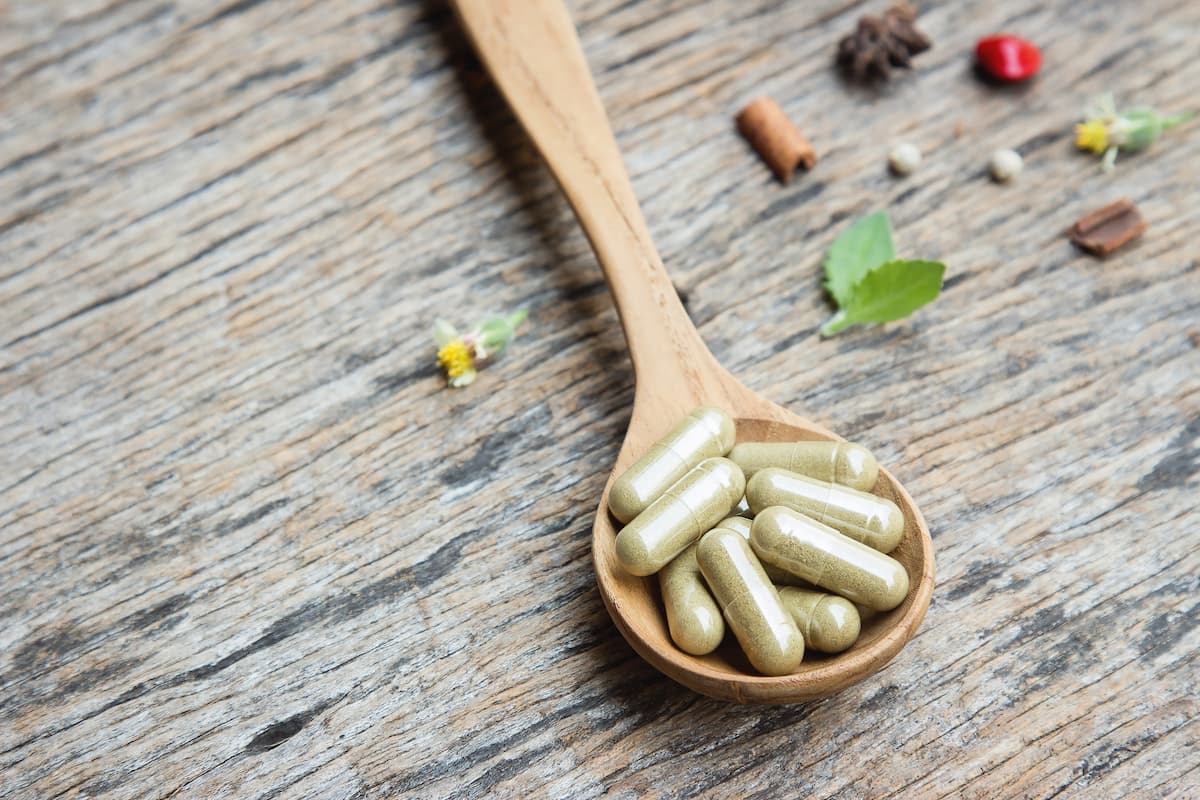
Ashwagandha affects thyroid hormone levels. Find out if you can use it.
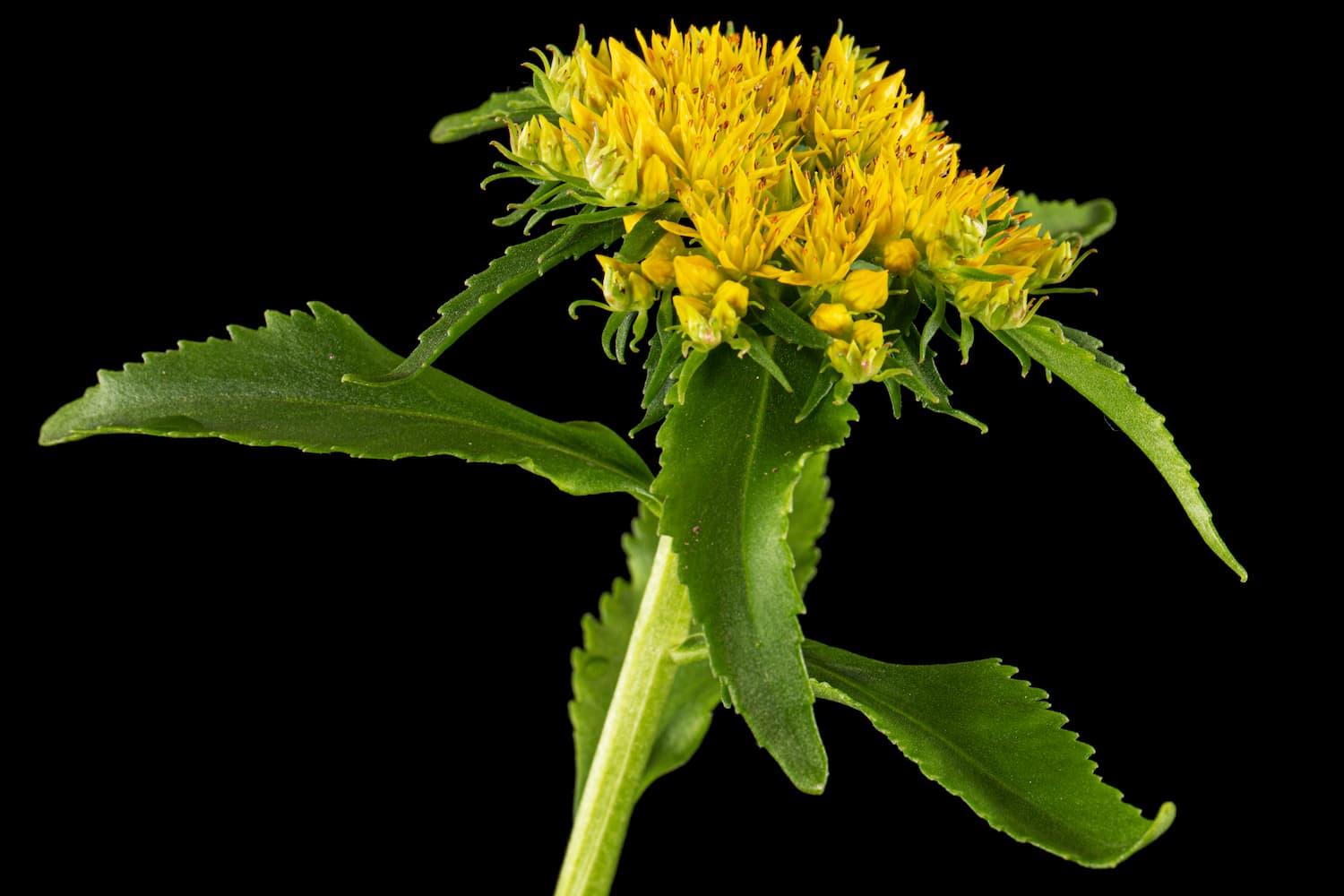
See how mountain pintail can affect your wellbeing.

Check out the opinions of doctors and other professionals about ashwagandha. Also find out what people on the forum think about it.
